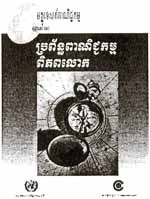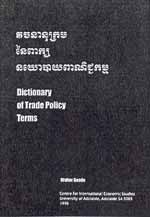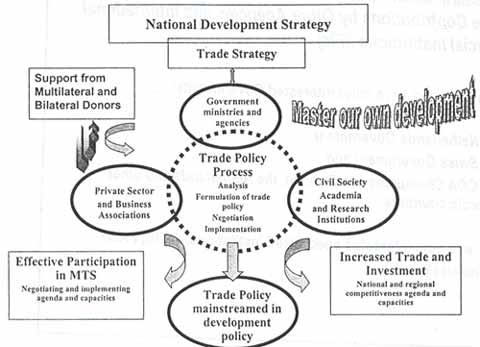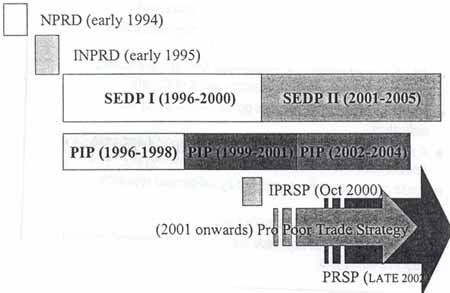|
|
The Millennium
Development Goals (MDGs) |
| |
|
|
 |
|
The
Millennium Development Goals (September, 2000) aspired to
the goal of developing a true Global Partnership for
Development which pointed to the establishment of an
inclusive and equitable globalization.
The
Millennium Declaration called for an open, rule-based,
predictable, non-discriminatory trading system, and a
commitment to good governance, development and poverty reduction-both nationality and internationally. |
|
|
UN LDC-III Conference in Brussels
WTO 4th
Ministerial Meeting in Doha |
|
|
 |
|
The
Quad countries statement at the UN LDC-III Conference
in Brussels (May 2001) and the Doha Ministerial
Declaration (November 2001) are full of promise for
trade-related assistance to help LDCs better address
their capacity need in relation to trade and poverty
reduction and to better participate in, negotiate and
implement WTO agreements. |
|
|
|
The
Financing for Development Conference's Monterrey
Consensus (March 2002) moved the commitment further
toward a new resource framework, which goes beyond ODA
and included mobilization of domestic resources,
revenue generated by trade, and FDI |
 |
|
|
 |
|
|
 |
|
|
|
 |
Cambodia
IF Model -
Where are we?
Status of its Implementation.
The mainstreaming process involves
5 stages.
First Stage: carry
out a country diagnostic trade integration study (DTIS). Cambodia
was one of the first countries to undertake and complete a
diagnostic trade integration study. |
|
 |
Cambodia
IF Model - Where are we?
Status of its Implementation. |
|
 |
Cambodia
IF Model - Where are we?
Status of its Implementation. |
| |
|
| Second
Stage: The second
step involves the organization of a national workshop to review
findings and policy recommendations of the DTIS including
identification of a technical assistance (TA) action plan.
Cambodia did this in November 2001. |
|
 |
Cambodia
IF Model -
Where are we?
Status of its Implementation.
The Third Stage
involves the endorsement by the Government and other stakeholders
of the policy recommendations and the TA Matrix.
Cambodia adopted the Diagnostic
Study and the TA Matrix in January 2002.
The 29th IAWG/DAC/OECD Joint
Meeting subsequently endorsed it in Paris in the same month. |
|
|
Cambodia IF Model
-
Where are we?
Status of its Implementation.
The Fourth stage involves the submission of the TA Matrix to donors for
financing. Within the 6 months period leading to the CG meeting
today, Cambodia has diligently and systematically worked with the
core agencies and bilateral donors to secure funding for
activities identified in the TA Matrix.
8 February 2002. The 30th
IAWG Meeting approved, and the IF Steering Committee endorsed, the
First IF project resulting from the Cambodia Diagnostic Study. The
project will use an earmarked fund of $500,000 from Japan
via the IF UN Trust Fund, and some co-funding from UNDP. |
|
|
Cambodia IF
Model -
Where are we?
Status of its Implementation.
The Fifth and Last Stage
of the mainstreaming process involves the responses of donors and
the six core agencies to follow up on the specific TA projects
identified in the TA Matrix, some of which will require long-term
effort |
|
 |
This CG
Meeting provides such an opportunity. |
|
 |
The TA
matrix is an evolving document. We welcome any fresh and |
|
creative
initiatives from everyone. |
|
 |
The World
is watching and more so the other 48 LDCs... |
|
Cambodia
IF Model - Where are we?
Status of its Implementation:
Visit of EU Trade Commissioner Pascal Lamy to Cambodia |
| |
|
|
 |
|
EC's
recent decision to earmark:
3.0 million TA for
Cambodia's accession to the WTO and SPS/TBT.
4.9 million TA for
Institutional Support Programs including TA for ASEAN and WTO
matters, trade negotiating skills. |
|
 |
|
Cambodia
IF Model - Where are we?
Status of its Implementation: |
| |
|
|
 |
|
Development
of the MoC website: "www.moc.gov.kh"
Capacity Building for trade support and trade
policy-making
Tools for Private Sector Support
Development of the Legal Framework
Translation and publication of the Trade
Diagnostic Report: "Cambodia: Integration and Competitiveness
Study"
Conference on Globalization
Support for WTO accession: Publication of of Results
of the Uruguay Rounds in Khmer |
|
| Cambodia
IF Model - Where are we? Status of its Implementation: |
|
|
 |
|
|
The Mekong
Project Development Facility (MPDF) |
|
Human
Capital/Entrepreneurial Know How
Finance for SMEs
Trade Promotion |
|
|
 |
|
Cambodia IF Model -
Where are we?
Status of its Implementation: |
|
|
|
 |
|
WTO Accession
Study Tours
Trainfortrade program
UNCTAD-ICC Investment
Guides
Translation of Trade
Negotiations Materials |
|
|
Cambodia IF
Model - Where are we? Status of its implementation: |
|
|
 |
|
|
|
|
Creation of
a Trade Support Network |
|
|
Membership
in the ITC's World Tr@de Net |
|
|
Development
of Essential Oils and Spices Industry |
|
|
ITC's
Export led Poverty Reduction Program (EPRP) |
|
|
South-South
Trade Promotion Programme: Demand Surveys for Agro-Products and
Processed Foods |
|
|
Cambodia IF Model
- Where are we? Status of its Implementation:
Active Contributions by Other Agencies and International
Financial Institutions (IFIs) |
|
|
|
|
Asian
Development Bank (ADB): $800,000.00 in TA |
|
|
Extension of
its regional program to provide access to their electronic law
database for the WTO Reference Center at the Ministry of Commerce
Establishment of a Secured Transactions System
Drafting of the Secured Transactions Law and Establishing
secured transaction systems
Drafting e-Commerce Law
Conduct an SME sector sub-strategy |
|
Cambodia
IF Model - Where are we? Status of its Implementation:
Active Contributions by Other Agencies and International
Financial Institutions (IFIs) |
|
|
|
|
UNESCAP |
|
|
WTO
Accession
Trade facilitation and e-commerce
Bangkok agreement
Poverty Alleviation and Social Integration
Trade policy and trade promotion |
|
Cambodia
IF Model - Where are we? Status of its Implementation:
Active Contributions by Other Agencies and International
Financial Institutions (IFIs) |
|
|
|
|
AUSTRALIA |
|
|
SPS |
|
|
|
|
AUSTRIA
- |
|
|
International
Standards and Technical Regulations:
Contribution to UNIDO of up to 600.000 to build trade-related
supply capacities |
|
|
|
|
CANADA |
|
|
WTO
accession process under a regional APEC program |
|
Cambodia
IF Model - Where are we? Status of its Implementation:
Active Contributions by Other Agencies and International
Financial Institutions (IFIs) |
|
|
|
|
JAPAN |
|
|
Capacity
Building for Pro-poor Trade Reforms
TBT, rice distribution system and marketing study
Regional Development Master Plan of the Phnom Penh
- Sihanoukville Economic Growth Corridor |
|
|
|
|
FRANCE |
|
|
IPR
protection (Geographical Indications) |
|
Cambodia
IF Model - Where are we? Status of its Implementation:
Active Contributions by Other Agencies and International
Financial Institutions (IFIs) |
|
|
|
|
SINGAPORE |
|
|
Initiatives
for ASEAN Integration (IAI) - Trade Training Program |
|
|
|
|
THAILAND |
|
|
Trade
related capacity building |
|
|
WTO
accession |
|
|
|
|
UNITED
KINGDOM |
|
|
Pro-poor
trade sector materials development and consultations with
stakeholders |
|
Cambodia
IF Model - Where are we? Status of its Implementation:
Active Contributions by Other Agencies and International
Financial Institutions (IFIs) |
NEW ZEALAND
Trade
policy and agriculture sector
analysis
Trade
Negotiations Tools |
 |
|
Cambodia
IF Model - Where are we? Status of its Implementation:
Active Contributions by Other Agencies and International
Financial Institutions (IFIs) |
|
|
|
| Possible
support from other interested Governments: |
|
|
|
|
|
Netherlands
Government
Swiss Government and
ODA Champions like Sweden, the Netherlands and
other Nordic countries
...and from interest specialized institutions: AITIC, FAO?
Who else? |
|
|
Cambodia
IF Model - How Did We Do? |
|
|
|
|
Designing
a sound trade policy framework: |
|
 |
A coherent
trade strategy that is closely integrated with a country's overall
development strategy. |
|
 |
Effective
mechanisms for consultation among stakeholders: government - the
enterprise sector - and civil society. |
|
 |
Effective
mechanisms for intra-government policy co-ordination. |
|
 |
A
Strategy for enhanced collection, dissemination and analysis of
trade related information. |
|
 |
Trade
policy networks, supported by indigenous research institutions. |
|
 |
Networks
of trade support institutions. |
|
 |
A
commitment by all key trade stakeholders to outward-oriented
regional strategies |
|
|
National
Development Strategy and the Trade Policy Process |
|
 |
|
|
|
"...Once
mainstreamed into the PRSP the role of trade will be firmly
situated within Cambodia's coherent national policy context and
its trade-related technical assistance needs will stand a much
better chance of being financed by donors and agencies..." |
|
|
 |
|
|
Mainstreaming
Trade Strategy into the Development Policies Towards Poverty
Reduction in Cambodia |
|
|
|
|
Cambodia
IF Model - How Did We Do? |
|
|
|
|
|
Trade
and Investment Linkages and other companion and mutually
supportive policies... |
|
 |
Formulating
a long-term financial sector development plan..."RGC's
Financial Sector Blueprint (the Blueprint) for 2001-2010" |
|
 |
Capitalizing
on the FDI Opportunities through Reforms of the Investment Regime. |
|
 |
Initiating
Regional Development Master Plan of the Phnom Penh - Sihanoukville
Growth Corridor |
|
 |
Bringing
in Private Participation in Infrastructure: Complete the Country
Framework report on Private Participation in Infrastructure (CFR)
With World Bank and the Public-Private Infrastructure Advisory
Facility (PPIAF) |
 |
Deepening
Economic Integration... |
|
 |
Cambodia's
"Diamond Opportunity": Cambodia-Thailand Joint Economic
Development.... |
|
 |
ASEAN |
|
 |
Strengthening
Economic Linkages within the Greater Mekong Subregion (GMS)... |
|
 |
Deepening
Regional Integration: Considering the process of acceding to
Bangkok Agreement.... |
|
 |
Opportunities
to secure world market access through WTO membership... |
|
|
Cambodia
IF Model - The Challenges
Ahead.... |
|
|
|
|
|
Increased
regional and international competition |
|
|
|
China's accession to
the WTO |
|
|
|
US granting MFN
status to Vietnam |
|
|
|
US's Farms Act ($190
billion in farm subsidies) |
|
|
|
AGOA |
|
|
|
End of the
Multi-Fiber Agreement in 2005 |
|
|
|
Difficulties in WTO
accession process (LDC-Plus or worse WTO-Plus) |
|
 |
High
concentration in only 3 poles (Phnom Penh, Sihanoukville,
Siemreap) |
|
 |
Cost
structure |
|
|
|
Cost of
infrastructure services |
|
|
|
Cost of trade
facilitation services |
|
|
|
Direct and indirect
taxes |
|
 |
Wages and
low labor productivity |
|
 |
Limited
trade support services |
|
|
|
Trade support services |
|
|
|
Trade promotion |
|
|
|
Trade financing |
|
 |
Weak
entrepreneurial capacity |
|
|
Cambodia
IF Model - The Challenges
Ahead....WTO accession |
|
|
|
|
|
 |
Difficulties
in WTO accession process (LDC-Plus or worse WTO-Plus) |
|
|
 |
Cambodia
pushes hard....
At the rate the accession process is moving Cambodia stands a
great chance to be the first LDC to accede to the WTO |
|
|
 |
But our
political will and commitment to accelerate the accession process
from Cambodia will not be enough... |
|
|
 |
The WTO
should consider the notion of so-called "fast track"
procedures for streamline bureaucratic procedures for admission
for Cambodia as an LDC as first suggested by the European Union |
|
|
 |
For
their part, WTO members should be realistic in their demands for
concessions from Cambodia and take due account of its unique
financial, economic, institutional and other constraints. |
|
|
Cambodia
IF Model - The Challenges
Ahead....WTO accession |
|
|
|
|
|
 |
Difficulties
in WTO accession process (LDC-Plus or worse WTO-Plus) |
|
|
 |
Moreover,
powerful WTO members should refrain from insisting on "LDC-plus"
or worse yet "WTO-plus" obligations for Cambodia, a
country that has no current or potential capabilities to become a
major player in the world market. |
|
|
 |
They
should take into account the internal adjustment shocks that
Cambodia will confront when complying with the new rules in the
absence of reasonable transition period. |
|
|
 |
It
is Cambodia as LDC which is in need of Transitional Period instead
LDC was asked to give transitional period to the Developed
Country. |
|
|
 |
Just
asking for a few reasonable schedules of commitments on goods and
services from Cambodia would be perceived as a positive gesture
from all WTO Members. |
|
|
 |
Therefore,
doing away with the LDC-plus and WTO-plus conditions for accession
and the automatic extension of Special & Differential
(S&D) provisions to Cambodia - as an acceding LDC - would seem
to be good starting points. |
|
|
Cambodia
IF Model - The Challenges
Ahead....WTO accession |
|
|
|
|
|
 |
"...It
may not be by trying at this stage to get the most of concessions
from a tiny country like Cambodia that WTO members will get
something substantial for their countries, it shall be instead at
the new round of trade negotiations kicked off at Doha last November
that more important and more substantial gains should be sought.
We do not rush to enter WTO just for the sake of being a member,
but to be in a position to play a more active role and to benefit
from the world trading system... Without bringing back to Cambodia
the benefits of globalization, the whole preparation process that
we have so far undertaken would be jeopardized by opposition
forces to globalization, which are still on the wait-and-see
position in Cambodia..." |
|
|
Opening Statement of
Cambodian Chief Negotiator
Commerce Minister Cham Prasidh
at the 2nd working Party in February 2002 |
|
|
Cambodia
IF Model - The Solutions....
Removing the Bottlenecks..... |
|
|
|
|
|
 |
To
overcome these constraints, we need to tackle "trade-related
capacity building" in two angles: |
|
|
 |
"trade
rules compliance capacity" which will enable Cambodia to
observe international trade rules better, and |
|
|
 |
"trade
competitiveness capacity" which will strengthen the supply
side and enable Cambodia to better exploit the improved market
access for its exports. |
|
 |
Improved
Conditions of market access |
|
|
Cambodia
IF Model - The Solutions.... |
|
|
|
|
 |
With
the appropriate trade related capacity building, Cambodia can
further reap the fruit of economic growth generated from trade
reform and openness. |
|
 |
But
we have much more work to do...in the many months to come |
|
 |
Additional
work will be carried out with assistance from donors and other
development partners to better understand the potential impacts of
trade reforms on the poor and to develop mechanisms which truly
support pro-poor growth. |
|
|
Cambodia
IF Model - The Challenges
Ahead.... |
|
|
|
|
"The
success of the IF initiative can only be determined over the
medium-term taking into account the extent to which the trade
agenda including the policy recommendations are meaningfully
included into the country's development process, and the extent to
which bilateral and multilateral agencies continue to respond to
the capacity building needs through the consultative group
processes of the key lending agencies, and bilateral donor country programmes and according to comparative advantage, the activities
of other multilateral agencies.
Ultimately,
success can only be defined on the basis that realised trade
improvements, will promote growth and contribute to welfare
gains..." |
|
|
Susan Prowse, The
World Economy Journal |
|
|
THANK YOU
FOR YOUR
ATTENTION |
|
|
|







